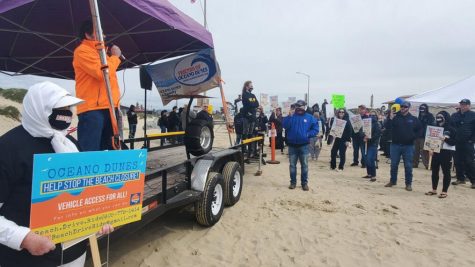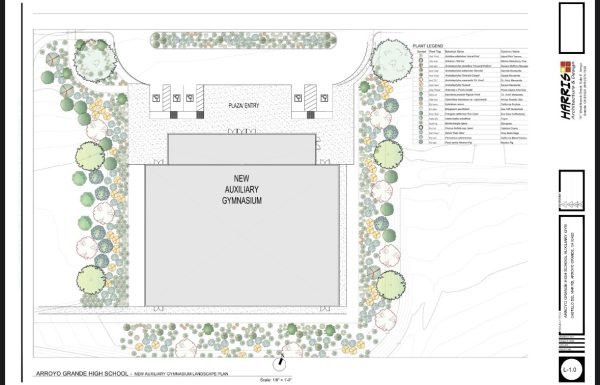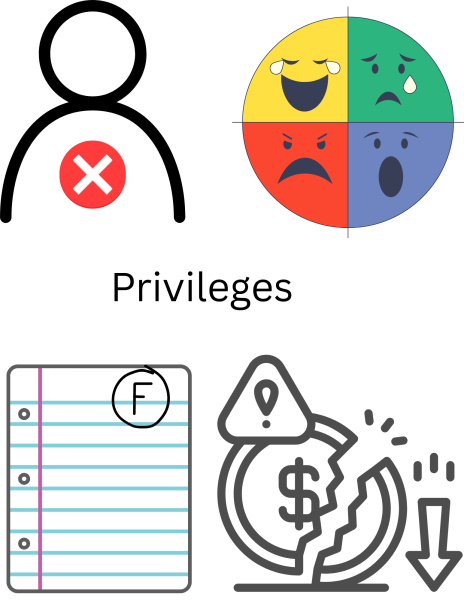Oceano Dunes to “Phase Out” Off-Highway Vehicle Usage Within Three Years
A group of OHV riders enjoy the sun at the Oceano Dunes (image courtesy of the State of California.)
The Oceano Dunes, an eight-mile strip of beach which separates the small town of Oceano from the Pacific Ocean, are located on the Central Coast of California. They are a habitat to the several species of endangered plants and animals that thrive among the sand mounds, and a playground for thrill-seekers, daredevils, and adrenaline junkies. The “dunes”, as they’re more commonly referred to, are one of the state’s most popular destinations for OHV (off-highway vehicle) enthusiasts. The size and shape of the sand dunes, combined with the general feeling of being on a beach, creates a perfect environment for the reckless driving of ATV’s and other recreational vehicles.
OHV’s began to appear on the Oceano Dunes in 1982 when California State Parks formed a temporary agreement with San Luis Obispo county and the Coastal Commission to allow the vehicles to be driven on the beach. After observing the popularity of OHV’s at the dunes and the economic activity they brought to the community, off-highway vehicles have enjoyed an extensive though legally unofficial presence at the dunes.
However, a new rule passed by county legislators could officially bring an end to OHV usage at the dunes. On March 18th, the California Coastal Commission cast a unanimous vote to “phase out” (a euphemism for flat-out ban) OHV’s within three years at the Oceano Dunes. This decision is the culmination of a decades-long battle between environmentalists and beachgoers over the fate of the dunes.
“It’s having significant detrimental impacts on beach and dune habitats as well as significant impacts on air quality and public health underserved in adjacent communities and sacred tribal areas,” stated Kevin Kahn, district supervisor of the Central Coast branch of the California Coastal Commission.
OHV activity on the dunes has raised many concerns over air pollution. Some claim that the massive level of sand particles released into the air by vehicles on the Oceano Dunes creates harmful amounts of particulate matter. When inhaled, these airborne particles, especially among young children and adults with pre-existing cardiovascular and respiratory issues, can result in adverse health issues ranging from mild (coughing, congestion, chest pain) to severe (increased heart attack and stroke risk, stunted lung development in children). Though these claims have been attacked in the past for being overstated or even pseudoscientific, they were tangible enough to be seriously considered by the California Coastal Commission in their final decision.
Members of the Northern Chumash Tribe have also voiced their opposition against vehicles on the dunes since the rule was first introduced in the 1980’s, arguing that OHVs pose too great of a threat to the area’s natural environment and wildlife. The voices of the Northern Chumash, who had lived on the Oceano Dunes for thousands of years, were not adequately heard by the California Coastal Commission until 2007, when guidelines for consultations with indigenous tribes were established. The Northern Chumash have been working harder to rid the Oceano Dunes of OHV’s since the beginning of the pandemic, and it seems that their recent efforts have finally come to fruition.
Some groups and activists have threatened to take legal action against the state for their verdict in March – most notably, the Friends of Oceano Dunes. Formed in 2001, the Friends of Oceano Dunes is a local organization that serves to “unite the many people that enjoy the Oceano Dunes” and “promote and reinforce responsible recreation.” The Friends, which represent roughly 23,000 off-roaders who use the dunes, filed a lawsuit against the California Coastal Commission on April 12th, claiming that the commission violated state law by falsely labeling itself as a lead agency and not studying the environmental consequences of human activity on the dunes before finalizing their choice.

“[The Commission] has no authority to direct State Parks to ban all off-highway vehicles at a park expressly authorized for off-highway vehicle use,” wrote Friends of Oceano Dunes president Jim Suty in an official statement, “especially where that use has lawfully existed for 40 years, and where the use predated even the creation of the Coastal Commission.”
Fears of the potentially negative economic impact the OHV ban will have on the community are also stirring up opposition against the new rule. Some businesses, such as ATV rental services, rely on the Oceano Dunes as their chief source of income, and the decreased presence of off-roaders visiting San Luis Obispo county could spell disaster for any businesses dependent on tourist revenue.
The California Coastal Commission’s order to phase out OHV usage at the Oceano Dunes has garnered equal amounts of support and controversy. With legal and social tensions rising against the Commission, it’s clear that the coming months will be crucial to both sides in securing a victory.

Adam Mercer is a senior at Arroyo Grande High School and a second-year reporter for the Eagle Times. He likes to read, write, listen to music, watch movies,...






